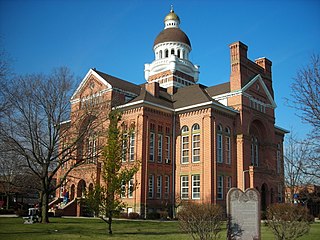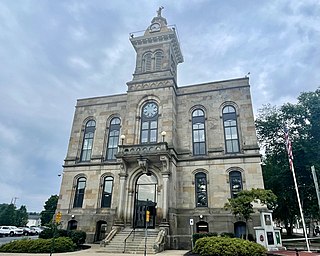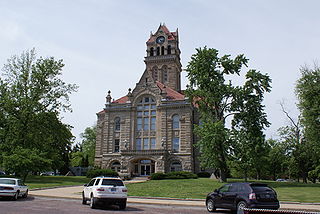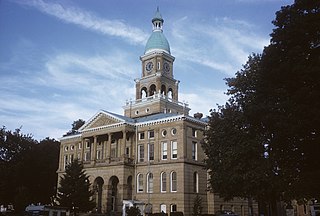
The Belmont County Courthouse is located at 101 West Main Street in St. Clairsville, Ohio, United States. It sits on the highest point in the St. Clairsville area and is thus visible from Interstate 70 and many other points in the Ohio Valley. It is a contributing property in the St. Clairsville Historic District, which was added to the National Register of Historic Places in 1969.

The Allen County Courthouse is an historic courthouse building located at the corner of North Main Street & East North Street in Lima, Ohio, United States. In 1974, it was added to the National Register of Historic Places.

The Cuyahoga County Courthouse stretches along Lakeside Avenue at the north end of the Cleveland Mall in downtown Cleveland, Ohio. The building was listed on the National Register along with the mall district in 1975. Other notable buildings of the Group Plan are the Howard M. Metzenbaum U.S. Courthouse designed by Arnold Brunner, the Cleveland Public Library, the Board of Education Building, Cleveland City Hall, and Public Auditorium.

The Paulding County Courthouse is a historic governmental building in downtown Paulding, Ohio, United States. A Richardsonian Romanesque building erected in 1886, it is the third courthouse to serve the residents of Paulding County.

The Fayette County Courthouse is a historic courthouse building located at 110 East Court Street in Washington Court House, Ohio. On July 2, 1973, it was added to the National Register.

The Geauga County Courthouse is located at 100 Short Court Street in Chardon, Ohio. The cornerstone was laid September 10, 1869 and construction was completed on August 20, 1870. The courthouse was listed on the National Register in 1974 as part of the Chardon Courthouse Square District.

The Darke County Courthouse, Sheriff's House and Jail are three historic buildings located at 504 South Broadway just south of West 4th Street in Greenville, Ohio. On December 12, 1976, the three buildings of the present courthouse complex were added to the National Register of Historic Places.

The Columbiana County Courthouse is located at 105 South Market Street in Lisbon, Ohio. The courthouse was added to the National Register on August 24, 1979, as part of the Lisbon Historic District.

The Delaware County Courthouse is located at 117 N Union St, Delaware, OH 43015 in Delaware, Ohio. The courthouse was placed on the National Register.

The Adrian Engine House No. 1 is a historic fire station located at 126 East Church Street in downtown Adrian, Michigan. It was designated as a Michigan Historic Site and listed on the National Register of Historic Places on August 21, 1989. It is located within the Downtown Adrian Commercial Historic District and next to the Lenawee County Historical Museum.

The Adrian Public Library is a historic structure located at 110 East Church Street in downtown Adrian, Michigan. Originally used as a library, it was designated as a Michigan Historic Site on December 14, 1976, and later listed on the National Register of Historic Places on December 6, 1977. It is located within the Downtown Adrian Commercial Historic District and adjacent to the Adrian Engine House No. 1. Today, the building houses the Lenawee County Historical Society Museum.

The Clark Memorial Hall, also known as the Adrian I.O.O.F. Hall, is a commercial building located at 120–124 South Winter Street (M-52) in the Downtown Adrian Commercial Historic District in Adrian, Michigan. It was designated as a Michigan Historic Site and individually listed on the National Register of Historic Places on January 14, 1985.

The Starke County Courthouse is a historic courthouse located at Knox, Starke County, Indiana. It was designed by the architectural firm of Wing & Mahurin, of Fort Wayne and built in 1897. It is a three-story, Richardsonian Romanesque style Indiana Oolitic limestone and terra cotta building. It has a Greek cross-plan and is topped by a tiled hipped roof. It features a 138 feet tall clock tower located at the roof's center.

The Tecumseh Downtown Historic District is a historic district comprising the downtown commercial area of the city of Tecumseh in Lenawee County, Michigan. It was designated as a Michigan Historic Site on January 16, 1976, and added to the National Register of Historic Places on April 17, 1986.

The William Hayden House is a private residence located at 108 West Pottawatamie Street in the city of Tecumseh in northeast Lenawee County, Michigan. It was designated as a Michigan Historic Site and added to the National Register of Historic Places on August 13, 1986.

The Joseph E. Hall House is a privately owned residential house located at 210 South Oneida Street in the city of Tecumseh in Lenawee County, Michigan. It was designated as a Michigan State Historic State and listed on the National Register of Historic Places on August 13, 1986. It is located just around the corner from the George J. Kempf House.

The Harrison County Courthouse, located in Logan, Iowa, United States, was built in 1911. It was listed on the National Register of Historic Places in 1981 as a part of the County Courthouses in Iowa Thematic Resource. The courthouse is the fifth building the county has used for court functions and county administration.

Edward Oscar Fallis, often known as E.O. Fallis, was an American architect of Toledo, Ohio.

The Hillsdale County Courthouse is a government building located at 29 North Howell Street in Hillsdale, Michigan. It was designated a Michigan State Historic Site in 1969 and listed on the National Register of Historic Places in 1982.

The Ionia County Courthouse is a government building located on East Main Street in Ionia, Michigan. It was listed on the National Register of Historic Places in 1979.
























